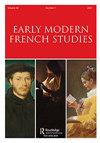近代早期正义与口述传统:布列塔尼民谣中的罪与罚
IF 0.2
3区 历史学
Q2 HISTORY
引用次数: 2
摘要
自19世纪以来,民族学家就开始收集讲述犯罪和正义故事的布列塔尼民谣。这些歌曲指的是发生在古代革命时期的一些犯罪和暴力事件。这些歌曲是在它们所描述的事件发生后不久创作的,在家庭和社区中流传了几个世纪,几乎完全是口头文化,因为这些歌曲的印刷大报在现代早期没有生产出来。布列塔尼民谣为早期现代文化中无所不在的声音元素提供了特权,因为歌唱在研究人员通常研究的书面和视觉来源中几乎没有留下痕迹。将这些歌谣与有关相同或类似案件的刑事档案文件进行比较,揭示了社区如何维持、适应和传播对当前事件和犯罪的记忆。这些歌曲的形成是出于忠实地保存当地历史事件细节的愿望,以及对其叙事方式进行调整以适应这一类型的诗歌需求的需要,这些歌曲深刻地洞察了表演这些歌曲并将其代代相传的社区的习俗和心态,特别是关于正义和道德问题。从方法论的角度来看,研究这些歌曲证明了比较口头和书面来源的重要性,以便更好地了解早期现代社会和文化。本文章由计算机程序翻译,如有差异,请以英文原文为准。
Early Modern Justice and Oral Traditions: Crime and Punishment in Breton Ballads
Breton ballads singing tales of crime and justice have been collected by ethnographers since the nineteenth century. These songs refer to a number of episodes of crime and violence that took place during the ancien régime. Composed shortly after the events they describe, they were passed on by families and communities over centuries, almost exclusively in oral culture, since printed broadsheets of these songs were not produced in the early modern period. The Breton ballads give privileged access to the omnipresent sonic element of early modern culture, since singing leaves few traces in the written and visual sources typically studied by researchers. Comparing the ballads with documents from the criminal archives concerning the same or similar cases reveals how communities maintain, adapt, and transmit the memory of current events and crime. These songs, shaped by a desire to preserve faithfully the details of local historical events and a need to adapt their storytelling to the poetic demands of the genre, give great insight into the customs and mentalities of the communities that performed them and passed them on through the generations, especially concerning questions of justice and morality. Studying these songs demonstrates from a methodological point of view the importance of comparing oral and written sources in order to better understand early modern society and culture.
求助全文
通过发布文献求助,成功后即可免费获取论文全文。
去求助
来源期刊

Early Modern French Studies
Multiple-
CiteScore
0.10
自引率
0.00%
发文量
14
期刊介绍:
Early Modern French Studies (formerly Seventeenth-Century French Studies) publishes high-quality, peer-reviewed, original articles in English and French on a broad range of literary, cultural, methodological, and theoretical topics relating to the study of early modern France. The journal has expanded its historical scope and now covers work on the sixteenth, seventeenth, and eighteenth centuries. Within this period of French literary and cultural history, the journal particularly welcomes work that relates to the term ''early modern'', as well as work that interrogates it. It continues to publish special issues devoted to particular topics (such as the highly successful 2014 special issue on the cultural history of fans) as well as individual submissions.
 求助内容:
求助内容: 应助结果提醒方式:
应助结果提醒方式:


